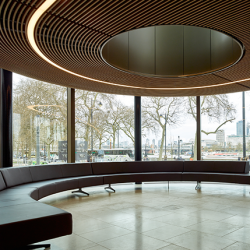October 31, 2017
Boundary-less workplaces must offer contextual, personalised workspaces
 The future workplace will replace familiar, rigid hierarchies and departments with small, collaborative networks of teams and the lines between individual organisations and ecosystems will blur as companies increasingly cast their net wider to innovate. This is one of the predictions made in a Fujitsu-commissioned whitepaper ‘Workplace 2025’ which argues that businesses must rethink social and technology strategies to plan for the future workplace – or risk being left behind. To appeal to future employees with the right skills, the whitepaper, which was produced by European research firm Pierre Audoin Consultants (PAC) advises that businesses must ensure they are moving towards an environment that provides contextual, personalised workspaces aligned to the individual needs of users. At the same time, they should plan to encourage enhanced peer collaboration by implementing technologies such as augmented reality. The Workplace 2025 report foresees that today’s organisational structures will become more agile, adapting to constantly-changing economic conditions, competitive landscapes and customer demands.
The future workplace will replace familiar, rigid hierarchies and departments with small, collaborative networks of teams and the lines between individual organisations and ecosystems will blur as companies increasingly cast their net wider to innovate. This is one of the predictions made in a Fujitsu-commissioned whitepaper ‘Workplace 2025’ which argues that businesses must rethink social and technology strategies to plan for the future workplace – or risk being left behind. To appeal to future employees with the right skills, the whitepaper, which was produced by European research firm Pierre Audoin Consultants (PAC) advises that businesses must ensure they are moving towards an environment that provides contextual, personalised workspaces aligned to the individual needs of users. At the same time, they should plan to encourage enhanced peer collaboration by implementing technologies such as augmented reality. The Workplace 2025 report foresees that today’s organisational structures will become more agile, adapting to constantly-changing economic conditions, competitive landscapes and customer demands.


































